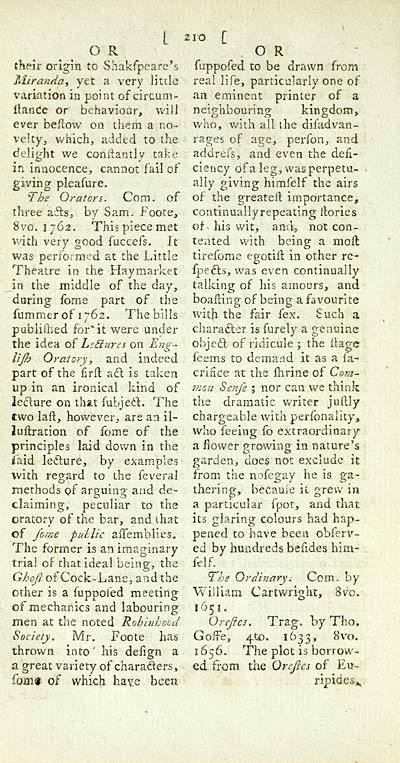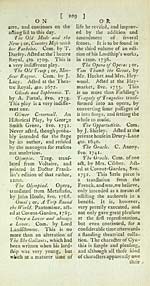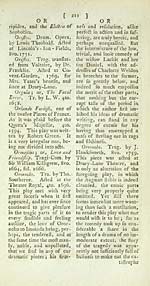Glen Collection of printed music > Printed text > New theatrical dictionary
(224) Page 210
Download files
Complete book:
Individual page:
Thumbnail gallery: Grid view | List view

t
O R
their origin to Shakfpeare's
Miranda, yet a very little
variation in point of circum-
itanCe or behaviour, will
ever bellow on them a no-
velty, which, added to the
delight we conitantly take
in innocence, cannot fail of
giving pleafure.
The Orators. Com. of
three ads, by Sam. Foote,
8vo. 1762. This piece met
with very good fuccefs. It
was performed at the Little
Theatre in the Haymarket
Jn the middle of the day,
during fome part of the
fummer of 1762. The bills
publifhed for" it were under
the idea of LeSiures on Eng-
lish Oratory , and indeed
part of the firit. a£l is taken
up in an ironical kind of
lecture on that fubjecr.. The
two laft, however, are an il-
luftration of fome of the
principles laid down in the
aaid lecture, by examples
with regard to the feveral
methods of arguing and de-
claiming, peculiar to the
oratory of the bar, and that
of fome puhlic aiTemblies.
The former is an imaginary
trial of that ideal being, the
Ghofi of Cock-Lane, and the
other is a fuppoied meeting
of mechanics and labouring
men at the noted Robinhood
Society. Mr. Foote has
thrown into' his delign a
a great variety of characters,
fom« of which hay.e been
2 10 [
O R
fuppofed to be drawn from
real life, particularly one of
an eminent printer of a
neighbouring kingdom,
who, with all the difadvan-
- rages of age, perfon, and
addrefs, and even the defi-
ciency of a leg, was perpetu-
ally giving himfelf the airs
of the greater!: importance,
continually repeating itories
of * his wit, and, not con-
tented with being a moll
tirefome egotiit. in other re-
flects, was even continually
talking of his amours, and
boafting of being a favourite
with the fair fex. Such a
character is furely a genuine
object of ridicule ; the flage
feems to demand it as a fa-
crifice at the fhrine of Com-
mon Se?ife ; nor can we think
the dramatic writer juftly
chargeable with perfonality,
who feeing fo extraordinary
a flower growing in nature's
garden, does not exclude it
from the nofegay he is ga-
thering, becauie it grew in
a particular fpot, and that
its glaring colours had hap-
pened to have been obferv-
ed by hundreds befides him-
felf.
The Ordinary. Corn, by
William Cartwright, 8vo.
1 65 1 .
Orefics. Trag. hy Tho,
Goffe, 4to. 1633, 8vo.
1656. The plot is borrow-
ed from the Orcftcs of Eu-
ripides^
O R
their origin to Shakfpeare's
Miranda, yet a very little
variation in point of circum-
itanCe or behaviour, will
ever bellow on them a no-
velty, which, added to the
delight we conitantly take
in innocence, cannot fail of
giving pleafure.
The Orators. Com. of
three ads, by Sam. Foote,
8vo. 1762. This piece met
with very good fuccefs. It
was performed at the Little
Theatre in the Haymarket
Jn the middle of the day,
during fome part of the
fummer of 1762. The bills
publifhed for" it were under
the idea of LeSiures on Eng-
lish Oratory , and indeed
part of the firit. a£l is taken
up in an ironical kind of
lecture on that fubjecr.. The
two laft, however, are an il-
luftration of fome of the
principles laid down in the
aaid lecture, by examples
with regard to the feveral
methods of arguing and de-
claiming, peculiar to the
oratory of the bar, and that
of fome puhlic aiTemblies.
The former is an imaginary
trial of that ideal being, the
Ghofi of Cock-Lane, and the
other is a fuppoied meeting
of mechanics and labouring
men at the noted Robinhood
Society. Mr. Foote has
thrown into' his delign a
a great variety of characters,
fom« of which hay.e been
2 10 [
O R
fuppofed to be drawn from
real life, particularly one of
an eminent printer of a
neighbouring kingdom,
who, with all the difadvan-
- rages of age, perfon, and
addrefs, and even the defi-
ciency of a leg, was perpetu-
ally giving himfelf the airs
of the greater!: importance,
continually repeating itories
of * his wit, and, not con-
tented with being a moll
tirefome egotiit. in other re-
flects, was even continually
talking of his amours, and
boafting of being a favourite
with the fair fex. Such a
character is furely a genuine
object of ridicule ; the flage
feems to demand it as a fa-
crifice at the fhrine of Com-
mon Se?ife ; nor can we think
the dramatic writer juftly
chargeable with perfonality,
who feeing fo extraordinary
a flower growing in nature's
garden, does not exclude it
from the nofegay he is ga-
thering, becauie it grew in
a particular fpot, and that
its glaring colours had hap-
pened to have been obferv-
ed by hundreds befides him-
felf.
The Ordinary. Corn, by
William Cartwright, 8vo.
1 65 1 .
Orefics. Trag. hy Tho,
Goffe, 4to. 1633, 8vo.
1656. The plot is borrow-
ed from the Orcftcs of Eu-
ripides^
Set display mode to: Large image | Transcription
Images and transcriptions on this page, including medium image downloads, may be used under the Creative Commons Attribution 4.0 International Licence unless otherwise stated. ![]()
| Special collections of printed music > Glen Collection of printed music > Printed text > New theatrical dictionary > (224) Page 210 |
|---|
| Permanent URL | https://digital.nls.uk/90318053 |
|---|
| Description | Scottish songs and music of the 18th and early 19th centuries, including music for the Highland bagpipe. These are selected items from the collection of John Glen (1833 to 1904). Also includes a few manuscripts, some treatises, and other books on the subject. |
|---|
| Description | The Glen Collection and the Inglis Collection represent mainly 18th and 19th century Scottish music, including Scottish songs. The collections of Berlioz and Verdi collected by bibliographer Cecil Hopkinson contain contemporary and later editions of the works of the two composers Berlioz and Verdi. |
|---|

